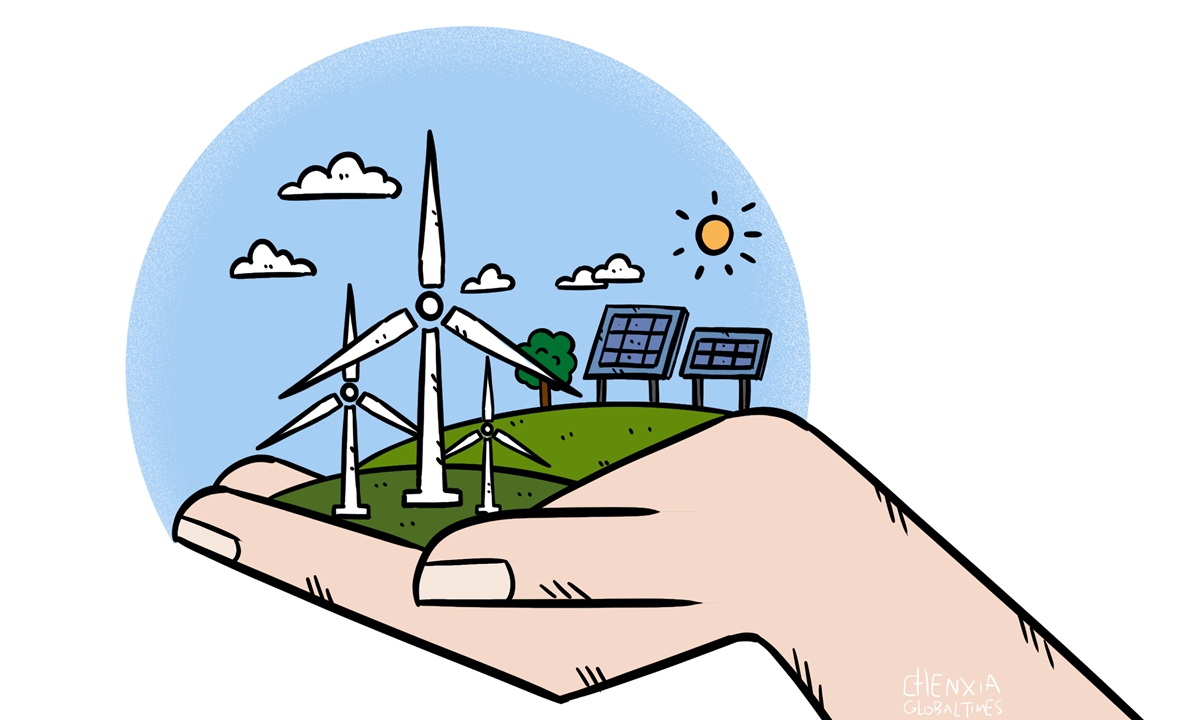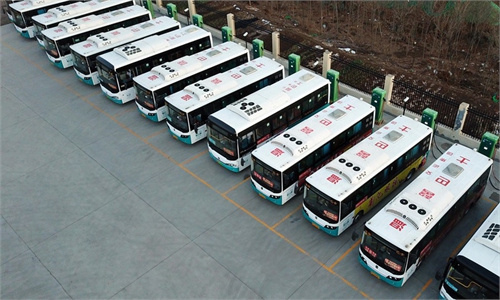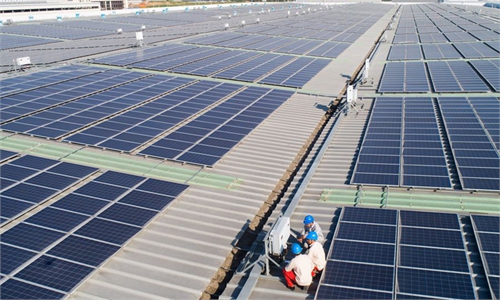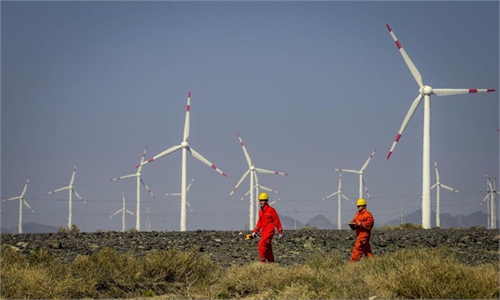COMMENTS / COLUMNISTS
China’s speedy clean energy penetration backed by huge market

Clean energies Illustration: Chen Xia/GT
As the world puts its focus on addressing climate change, the speed of major economies in developing eco-friendly clean energies and high-tech industrial products, like solar panels and electric vehicles, will be tested.
China has made marked progress in researching and deploying clean energy technologies and renewable industrial products over the past 10 years, helping the country gain a significant competitive advantage and paving the way for it to continue to lead the world in promoting greener innovations and high-quality economic growth.
Now, being a front-runner in installed solar power, solar manufacturing capacity and solar farm exports, Chinese companies are also strong in wind turbine manufacturing and battery-electric research, development and storage. Incentivized by the Chinese government's favorable taxation policies, renewables sales are running briskly in the country.
According to the Chinese Ministry of Commerce, in 2020, despite the corona-virus outbreak, electric vehicle (EV) sales rose 10.9 percent in China to reach 1.367 million, accounting for 44.1 percent of global electric vehicle sales last year.
In first-tier cities like Beijing, Shenzhen, Guangzhou and Shanghai, the previous gas-powered public bus and taxi fleets are being replaced by clean EVs. With carbon emissions drastically reduced in cities, millions of Chinese urbanites are enjoying huge environmental benefits.
US President Joe Biden's latest $2.25 trillion fiscal spending plan to overhaul US infrastructure, the biggest such initiative in the past 50 years, is said to cause a "green tidal wave," speeding US transportation industry's shift to clean electricity from carbon-based fuels.
China's central government energized international climate ambitions last year by pledging to peak carbon emissions before 2030 and reach carbon neutrality before 2060, building upon an earlier EU commitment to do the same by 2050.
High-speed train systems, high-speed ubiquitous wireless connections, and high-speed development of clean energies and renewables manufacturing are catapulting China's economy and national competitive strength to a new height.
It is widely believed that, with the government's unparalleled efforts to shore up semiconductor manufacturing, high-end software development, and in-vestment in artificial intelligence, industrial robotics, and quantum computing, China is to stand solidly among the next round of global economic and technological contests.
As always, the speed of transformative digitalization and decarbonization is propelling industrial upgrade and revolution in China. The crux of competition lies in the country's speed - as the world has witnessed the formidable pace with which China has rebuilt its bridges, tunnels, expressways, railroads, subways, dams, water-diversion projects, city high-rises, and special economic zones.
Some global organizations predict that faster power-sector decarbonization - with the traditional coal and gas-powered generators giving way to hydropower, solar power, wind power, tidal power and nuclear power - will consistently drive up China's industrial innovation and constantly improve the competitiveness of Chinese companies.
Meanwhile, faster development of clean energies and renewable industrial products, like electric bikes, mopeds and cars, is estimated to increase the country's economic growth by up to 15-18 percent by 2030, according to cal-culation by some economists.
Decarbonization is an inevitable global trend - as China, Europe and the US are all vigorously promoting new and renewable energies to tackle global cli-mate change.
Bloomberg New Energy Finance has forecasted that globally, electric vehicles will reach 28 percent of 2030 new auto sales and 58 percent of 2040 auto sales. Canalys' latest research says in 2021, electric car sales will rise to 5 million, and in 2028 the sales will explode to more than 30 million.
Aggressive green initiatives incentivizing electric vehicle sales have proven the edge of government policies. For instance, around $10,000 subsidies are offered to EV buyers in Germany, while in China, the average subsidy ranges from $2,000-3,500. Additionally, all provincial and city governments in China have worked out preferential tax policies to encourage car-hailing and courier platforms to use eco-friendly electric cars, electric mopeds and scooters for shared mobility.
Inspired by the policies, Chinese shoppers are snapping up clean EVs, as major electric vehicle makers Nio, Xpeng and Lixiang shipped 20,060, 13,340 and 12,579 electric cars, respectively in the first three months of 2021, rising more than 320 percent from 2019.
Other major EV makers, including Tesla, BYD and Geely, have also acceler-ated sales. Tesla sold 147,997 cars in China in 2020, with its Model 3 and Model Y the best-sellers. Also, the world's leading mobile phone maker, Xiaomi, last week decided to invest $10 billion to launch an EV plant in China. Xiaomi already offers the Mi Electric Scooter 1S in China.
As proven many times in recent years, China's market size will have the final say in swaying a multinational company's investment and marketing decisions on whether they will or can decouple from the huge Chinese market. German and Japanese carmakers know it dearly; GM, Ford and Tesla have followed suit. Soon, the Biden administration will get to know it too.
The author is an editor with the Global Times. bizopinion@globaltimes.com.cn



